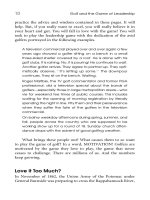Tài liệu Golf and the game of leadership 12 docx
Bạn đang xem bản rút gọn của tài liệu. Xem và tải ngay bản đầy đủ của tài liệu tại đây (192.73 KB, 10 trang )
5
9
Responsibility
The price of greatness is responsibility.
Winston Churchill
The Masters Tournament is held annually at the Augusta National
Golf Club in Augusta, Georgia. The score sheets for the tourna-
ment carry a message from its founder, the golfing great Bobby
Jones. ‘‘In golf, customs of etiquette and decorum are just as im-
portant as rules governing play.’’ Spectators and golfers alike are
reminded of their responsibilities.
In addition to following the rules of golf as they play, golfers
have other responsibilities. They essentially boil down to ‘‘keeping
their house (course)’’ in order. For example, divots (turf removed
by the club during a shot) are to be replaced, sand traps are to be
raked following recovery from the misfortune of having landed in
one, golf carts and golf bags are never to be placed on the green,
and players behind you are not to be held up unnecessarily.
Peter Koestenbaum in his book, Leadership: The Inner Side Of
Greatness, states that leading requires ‘‘ownership’’ of the mean-
100
10589$ $CH9 02-23-04 16:44:58 PS
101
Responsibility
ings of personal responsibility and accountability. According to
Christine Brennan:
Now, more than ever, I am convinced our national pastime
should be golf. . . . There is no game on the sports landscape
more noble and pure than golf. It’s the only sport I know in
which the players at all levels, from beginner to millionaire,
willingly call penalties on themselves.
1
Pay for Responsible Play
So, golf is an honorable game, a responsible game, a game in
which the majority of players, being honorable, responsible peo-
ple, don’t need referees or umpires. On the Golf Channel, no one
blames America for everything bad that happens to them. In golf,
you alone are ultimately responsible for what happens to you. No
whining is allowed on the Golf Channel. Your ball ended up
where it did because you hit it there or because it took a crazy,
uncontrollable bounce. Too bad, that’s golf . . . that’s life . . . that’s
leadership.
Professional golfers are compensated in direct proportion to
how well they play. They don’t hold out for more money, or de-
mand new contracts, because of someone else’s deal. When they
make a mistake, no one is there to cover for them or back them
up. Golfers cannot fail 70 percent of the time, like .300 hitters in
baseball, and expect to make $10 million a season.
During the economic boom years of the 1990s, there was little
complaint regarding executive compensation. However, behavior
that was once acceptable, or simply overlooked, can overnight be
seen as outrageous and irresponsible. Institutional investors and
shareholders express their unhappiness with large executive com-
pensation plans and poor corporate performance. The value of
many large companies has been significantly reduced and in some
cases virtually wiped out. Yet, the pay of their leaders has risen,
their pensions have been protected while those of many long-
service employees have been reduced severely, and golden para-
chutes are still there if they are forced to leave their organizations.
They seem to be rewarded for just being there. This doesn’t just
10589$ $CH9 02-23-04 16:44:58 PS
102
Golf and the Game of Leadership
occur in business. It’s happening in health care, government, and,
critics would say, most egregiously in higher education. If these
so-called leaders were golfers, they wouldn’t make the cut and
they wouldn’t be paid.
Golf is an honorable game. Its rules do not change. Leadership
too is an honorable game. Its rules also do not change. Your
school may have done away with winners and losers but golf has
not. Your school may have abolished failing grades, now giving
‘‘students’’ as many chances as they need to get the right answer,
or credit just for ‘‘trying’’ even if they never get it right! This
doesn’t bear the slightest resemblance to anything in real life.
Golf is the model for real life. In real life people actually have
to play their own ball. Real leaders play their own ball. It’s their
responsibility. And they insist others play responsibly as well.
Top Finishers Are the Best Prepared
An unknown author wrote, ‘‘Success has a thousand fathers. Fail-
ure is an orphan.’’ Some golfers may seek to blame their poor play
on the environment (wet grounds, too much wind, old clubs, or
pin placements). The dedicated golfer attempts to improve the
ability to play well no matter the conditions. Whether greens are
wet or dry, slow or fast, they’ve practiced how to play them. The
conditions of play are not always the same for golfers in competi-
tion. If you have witnessed the variances in weather from morning
to afternoon in British Open play you know what I mean. The top
finishers are the players best prepared to handle the contingencies.
They’ve developed the needed skills through responsible prepara-
tion. Long hours of practice in all kinds of conditions may not be
fun but they do it because it is necessary to increase their skills to
gain the ‘‘slight edge.’’ They assume the responsibility for im-
proved effectiveness. They want to win but know winning is not
easy. This is true of responsible leaders as well.
Committed leaders will assume more responsibilities than
they are formally assigned in order to accomplish goals they be-
lieve in. They will accept less than ideal working conditions, make
do with fewer resources than they would like, and even work with
10589$ $CH9 02-23-04 16:44:59 PS
103
Responsibility
little or no appreciation from the boss as long as they can be
successful. If the leader acts responsibly, he or she can inspire
others to succeed. In doing so , the organization, the team, and
the leader are well served. As in golf, this kind of a win is never
along the path of least resistance.
According to Koestenbaum, the leadership mind is character-
ized by ‘‘hope’’, i.e., by the realistic perception that there is a way
out, that there is a future, that there is a solution. This is the golfer
who must put an errant shot, a bad hole, or a bad round out of
his or her mind and focus on doing well on the next hole or in
the next round. This is the leader who lives not only in yesterday
and today as administrators do, not only in yesterday, today, and
tomorrow as managers do, but who lives in yesterday, today, to-
morrow, and most importantly in the day after tomorrow.
What Matters Most
Philosophy is the world’s oldest science. Today’s proliferating
leadership techniques (panaceas) are adjuncts to the tradition of
leadership philosophy. They may be helpful in a technical, by-the-
numbers sense, but they are not effective substitutes for the depth
of a philosophy. Leadership philosophy is the seat of self, the
foundation of the soul, the leadership character. Character means
depth, not technique. Integrity means substance, not form. In our
leadership affairs, we must allow our consciences to call us back
to the things that matter most. Leading requires ‘‘ownership’’ of
the meanings of personal responsibility and accountability. Lead-
ership is an honorable game.
Oops!
A number of years ago an incoming jumbo jet from the Far East
landed short of the runway at San Francisco International Airport.
Unfortunately, as those of you who have flown into San Francisco
know, this meant the plane landed in San Francisco Bay. At the
inquiry into what had happened to cause this crash landing, the
pilot was asked for his explanation. To the great surprise of all in
attendance at the hearing he responded, ‘‘I screwed up.’’
10589$ $CH9 02-23-04 16:44:59 PS
104
Golf and the Game of Leadership
A Case of Corporate Responsibility
In the Fall of 1982, Johnson & Johnson was confronted with a
crisis when seven people in Chicago died mysteriously. It was de-
termined that each of the people who had died had ingested an
Extra-Strength Tylenol capsule laced with cyanide. The news
caused an immediate nationwide panic.
Johnson & Johnson’s response was unusual for a corporation
in crisis. In other similar cases, companies put themselves first.
For example, when benzene was found in Source Perrier’s bottled
water, instead of accepting accountability, they claimed it was only
an isolated incident and recalled a limited amount of product in
North America. When the benzene was later found in their
bottled water in Europe, they had to issue a worldwide recall.
Consumers around the world had apparently been drinking con-
taminated water for months. Source Perrier was widely criticized
for lack of responsibility and disregard for public safety.
Johnson & Johnson’s responsible actions in dealing with the
Tylenol crisis led also to the product’s comeback in the market-
place. Chairman James E. Burke said, ‘‘It will take time, it will
take money, and it will be very difficult; but we consider it a moral
imperative, as well as good business, to restore Tylenol to its posi-
tion [as the number one alternative to aspirin as an over-the-
counter pain killer].’’
2
The universal human response to a failed situation or ‘‘screw-
up’’ is to find someone or something else to blame, or to give a
rationalizing justification for the unsatisfactory turn of events.
This is the well-known phenomenon known as CYA (cover your
posterior). We see the difference between a responsible leadership
approach and CYA in the actions of Johnson & Johnson and
Source Perrier.
Mountain Dew: A Case of Individual
Responsibility
A huge NATO naval exercise was conducted in the Pacific
Ocean. The exercise lasted forty-five days. Ship replenish-
ment was a major responsibility of both ship and shore par-
10589$ $CH9 02-23-04 16:45:00 PS
105
Responsibility
ticipants. Among the orders placed with a shore supply
facility was one for $3,000 worth of Mountain Dew soda,
approximately 1,500 12-packs. As you probably know,
Mountain Dew contains caffeine and is a favorite of night-
watch-standing Navy personnel. The order was intended
to supply several ships in addition to the one that was pick-
ing it up at the shore facility.
The receiving ship’s supply officer, a lieutenant com-
mander, was supervising the loading of replenishments,
when he was joined on the pier by the shore facility’s sup-
ply officer, a lieutenant.
The lieutenant commander said, ‘‘Everything is going well
except I don’t see our Mountain Dew anywhere.’’
The lieutenant said, ‘‘I’ll check on it,’’ and went directly to
his leading petty officer, who was supervising the operation
on the pier. He quickly learned there was no Mountain Dew
on the pier for loading and no paperwork indicating it had
been ordered. He reported this to the lieutenant com-
mander.
‘‘I know we ordered it,’’ responded the lieutenant com-
mander in a concerned but not offensive manner. So, the
lieutenant went back to his offices to check, and, wouldn’t
you know, he found the order on his desk, buried under a
pile of papers. He had obviously missed it. He knew he was
at fault and immediately reported the mistake to his boss,
the chief of staff for supply, who commented, ‘‘You
screwed up, but it’s not mission critical. Go tell them what
happened.’’
The lieutenant hustled back down to the pier and advised
the lieutenant commander of his error. Though he was
upset, the lieutenant commander accepted the lieuten-
ant’s apology. They agreed the Mountain Dew would be
on the pier the following week when the replenishment ship
returned, and the shore facility would bear the cost of
$3,000.
A simple story but with great leadership impact. The lieu-
10589$ $CH9 02-23-04 16:45:00 PS
106
Golf and the Game of Leadership
tenant recognized he had made a mistake and took
immediate responsibility for it. Both the lieutenant com-
mander and the chief of staff acted responsibly in accept-
ing the lieutenant’s explanation and apology, took into
account the otherwise excellent job he and his people
were doing under the stressful activity of the fleet exercise,
and kept their cool.
The reaction of the chief of staff left the lieutenant with the
feeling that he could ‘‘go to the boss’’ with anything and
would not be blown out of the water without a fair hearing.
The incident, handled responsibly by all involved, set the
stage for a continuing open relationship regarding the
sharing of positive, and not so positive, communications.
A Case of Irresponsibility
A local supplier was receiving complaints from a customer
that a plastic part was not fitting properly under a fender
during vehicle assembly operations and was causing pro-
duction problems. So, a two-person team, consisting of a
management and a union representative, went to the cus-
tomer’s plant to see whether they could determine the
cause of the problem. As they observed the operation,
they noticed that the woman who was putting the part on
the left fender was having a very difficult time while the
man assembling on the right fender had no problems at all.
They watched the operation with the supervisor for about
twenty minutes and were just about ready to leave the line
when the supervisor was called away. They watched the
two assemblers for another moment or two and then the
male assembler left his station and approached them.
‘‘Do you recognize what’s just happened to you?’’,he
asked.
They shook their heads, not knowing what the fellow was
driving at.
‘‘I usually work the side you’ve been watching,’’ he said,
‘‘and I don’t have any problems at all. Mary has never
10589$ $CH9 02-23-04 16:45:01 PS
107
Responsibility
done the job before. She was placed there a half hour ago
with no training, just before you got here. The foreman
thinks the production rates are too high so he figures out
ways to slow things down and blames the lower production
on the parts not fitting.’’
The team tried, and others from the supplier did as well, to
convince the customer that the parts were fine but
couldn’t do anything about the supervisor’s sabotage of
the process. The problem lasted two years. It was resolved
when the supervisor was transferred.
Someone Needs to Step Up
A multi-location home products company initiated a com-
prehensive employee involvement program. A major as-
pect of the program was the solicitation of ideas from
employees. The idea for a fitness center was presented for
review by a steering committee. The committee was made
up of four hourly and four salaried employees. The proposal
suggested that due to space limitations it would be neces-
sary to build a second floor over part of the existing com-
pany building at the cost of about $400,000. This did not
include the exercise equipment. The total cost including
equipment would be $600,000.
The pressure to make employee involvement work was in-
tensely felt throughout the organization. So, although the
steering committee members all felt that the idea was far
too expensive, no one would stand up and say, ‘‘No, we
can’t do this.’’
And, in the age-old tradition of not biting the responsibility
bullet, the steering committee recommended the presen-
tation for the fitness center be given to the divisional steer-
ing committee. It was, and you guessed it, from there it was
passed on to corporate because no one would say, ‘‘No,
this shouldn’t be done. There are cost problems, space
problems, what about insurance, who’s going to monitor
the center, etc.’’
10589$ $CH9 02-23-04 16:45:01 PS
108
Golf and the Game of Leadership
The fitness center was built. Now the company has a fitness
center at each of its fifty or so locations. Maybe this was a good
idea right from the start. I don’t know. But the process is familiar
and it is not a responsible one. It reminds me of an illustration I
often use. The leader is walking along this dock toward the water,
which is thirty feet deep off the end of the dock. Followers line
the dock. You, the leader, can’t swim. Do you want your people
cheering ‘‘Go for it!’’ Or, do you want them yelling, ‘‘Stop, you’ll
drown!’’ I know what my preference is, what’s yours?
Lose Responsibility, Lose Control
Few people stop to realize that in blaming others or escaping re-
sponsibility through justification, one is at the same time losing
control of the situation. (It is equivalent to the golfer blaming the
club, the caddie, or the weather. The stroke, the score, still stands.)
The individual who accepts 100 percent responsibility for all
events and relationships in which he or she takes part is thereby
empowered. External events (the club, the caddie, the weather) do
indeed add an uncontrollable factor, but if the individual acts as
if 100 percent responsible, then there is no possibility of evasion
through blame or justification. The result is that the individual is
forced to examine ways to improve the situation
Evasion is basically passive; its opposite is the active role,
which provides the person who accepts responsibility with an ef-
fective response to the screw-up. This holds true for work-related
tasks and for personal relationships. A responsible person looks
into all options, examines them, and is empowered to direct the
situation by choosing one. The individual is strengthened, the fear
of embarrassment or ridicule is minimized, and most importantly,
the situation moves positively toward improved results.
Why Are You Sawing that Hole?
A group of people were on a sightseeing boat touring the San
Diego harbor. A woman observed a man seated in a chair. She
couldn’t believe what she was seeing. He had a saw and was saw-
10589$ $CH9 02-23-04 16:45:01 PS
109
Responsibility
ing a hole in the bottom of the boat right where he sat! ‘‘Stop
that,’’ she yelled, ‘‘what do you think you’re doing? You’ll sink the
boat!’’
‘‘Lady,’’ he replied, ‘‘this is my seat, and I’ll do with it what I
want.’’
Responsibility is not doing what you want to do, especially at
the risk of harming others. It is not rank or privilege. It is doing
the right thing and expecting no less from others.
The real golfer, playing the honorable game of golf,
accepts 100 percent responsibility and moves forward.
The real leader, playing the honorable game of
leadership, can and should do no less!
FORE! . . . the author
Quick Tips for Improving Your Leadership
Game
Real leaders typically understand and model the following in their
day-to-day actions:
■
Believe that you have the power to make a difference and
take responsibility for trying to make that difference.
■
Be a fixer, not a finger-pointer.
■
View the failure of an associate to succeed as your failure
unless you have done everything possible to enable the as-
sociate’s success.
■
If one of your associates has a chronic performance prob-
lem that no one has addressed, then you deal with it.
10589$ $CH9 02-23-04 16:45:02 PS









